Robeson
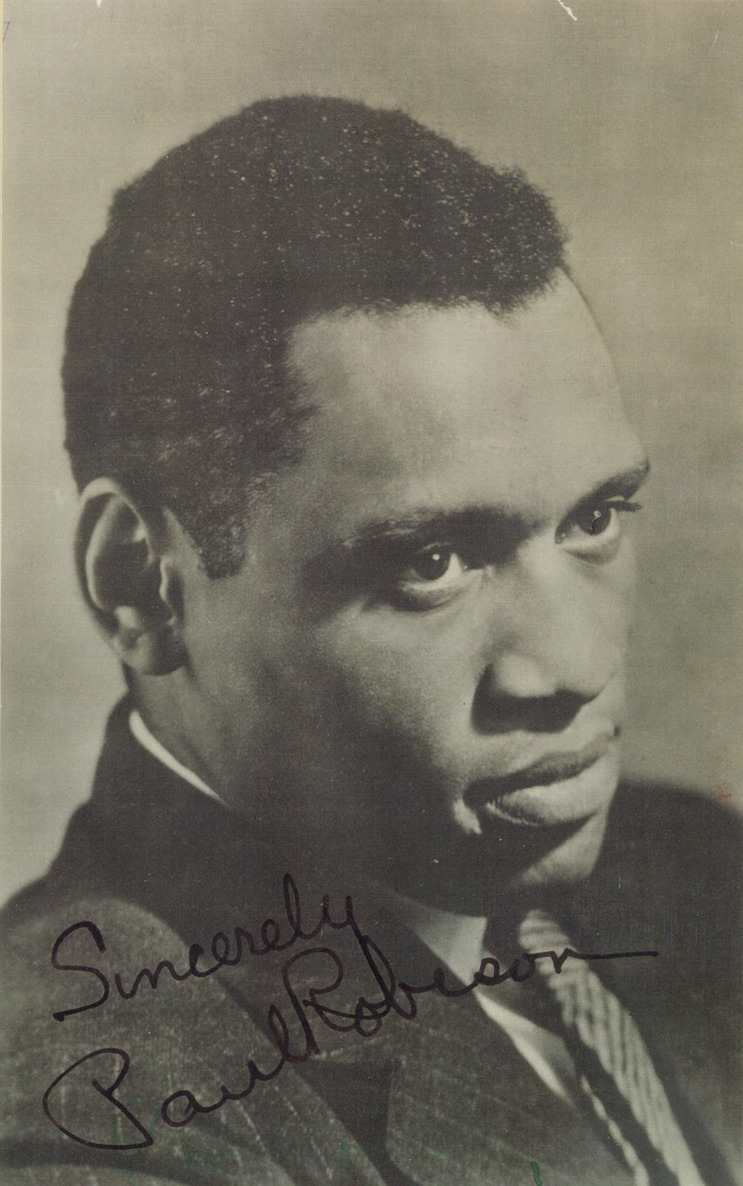
Robeson
An American Ballad
Arnold H. Lubasch
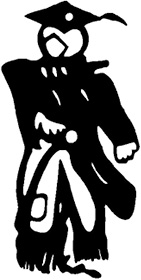
THE SCARECROW PRESS, INC.
Lanham Toronto Plymouth, UK
2012
Published by Scarecrow Press, Inc.
A wholly owned subsidiary of The Rowman & Littlefield Publishing Group, Inc.
4501 Forbes Boulevard, Suite 200, Lanham, Maryland 20706
www.rowman.com
10 Thornbury Road, Plymouth PL6 7PP, United Kingdom
Copyright 2012 by Arnold H. Lubasch
All rights reserved. No part of this book may be reproduced in any form or by any electronic or mechanical means, including information storage and retrieval systems, without written permission from the publisher, except by a reviewer who may quote passages in a review.
British Library Cataloguing in Publication Information Available
Library of Congress Cataloging-in-Publication Data
Lubasch, Arnold H., 1932
Robeson : an American ballad / Arnold H. Lubasch.
p. cm.
Includes bibliographical references and index.
ISBN 978-0-8108-8522-6 (cloth : alk. paper) ISBN 978-0-8108-8523-3 (ebook)
1. Robeson, Paul, 18981976. 2. African AmericansBiography. 3. SingersUnited StatesBiography. 4. ActorsUnited StatesBiography. 5. Political activistsUnited StatesBiography. I. Title.
E185.97.R63L83 2012
782.0092dc23 [B] 2012020971
 The paper used in this publication meets the minimum requirements of American National Standard for Information SciencesPermanence of Paper for Printed Library Materials, ANSI/NISO Z39.48-1992.
The paper used in this publication meets the minimum requirements of American National Standard for Information SciencesPermanence of Paper for Printed Library Materials, ANSI/NISO Z39.48-1992.
Printed in the United States of America
Contents
Preface
Our Paul
S imply stated, Paul Robeson was one of the most extraordinary men of the twentieth century.
He was a Phi Beta Kappa student, an all-American football player at Rutgers College, and the quintessential scholar-athlete who worked his way through Columbia Law School by playing professional football on weekends. He went on to become a groundbreaking black actor in plays and films, as well as the most celebrated concert singer of his time, overcoming racial prejudice all the way. He also became a political activist and a vigorous crusader for civil rights and world peace.
His fight for black people and his support of the Soviet Unionat a time when racism and communism aroused the most intense emotionsproduced an overwhelming storm of political hostility that devastated his career, damaged his health, and banished his name from American history for many years. If Robesons uncritical support of Soviet policies was mistaken, as it assuredly was, he paid an excessively high price for it.
* * *
From the Harlem Renaissance of the 1920s to the turbulent 1930s, World War II, the Cold War, and the years leading to the civil rights movement, Paul Robeson was a significant figure in New York, London, Moscow, and around the world.
His starring role in Othello won the highest acclaim in the theater. His singing of Ballad for Americans was a historic event. He raised Negro spirituals to an art form and was hailed as the voice of his people. He promoted African culture long before it became popular to do so, one of the many ways in which he was ahead of his time. And he transformed the musical lament of Ol Man River into his signature song of defiance.
The remarkable range of his talents and activities brought Robeson into contact with a wide array of prominent people. Among his friends were Eugene ONeill, Sergei Eisenstein, Albert Einstein, George Gershwin, Jerome Kern, George Bernard Shaw, W. E. B. Du Bois, Lorraine Hansberry, and Marian Anderson.
He confronted President Harry S. Truman and campaigned with Henry Wallace, was a guest of Soviet premier Nikita Khrushchev, befriended Jawaharlal Nehru of India before that man became a world leader, and mentored Harry Belafonte, Sidney Poitier, and Lena Horne.
Beyond his achievements, Robeson had a unique personal qualitya sense of enormous decency and dignitythat you felt immediately upon meeting him. The people of Harlem often called him Our Paul. And many other people of all colors shared that feeling of affection for him, the feeling that he belonged to them too.
Astute critics likened him to the great redwood trees of California and described him as the tallest tree in our forest.
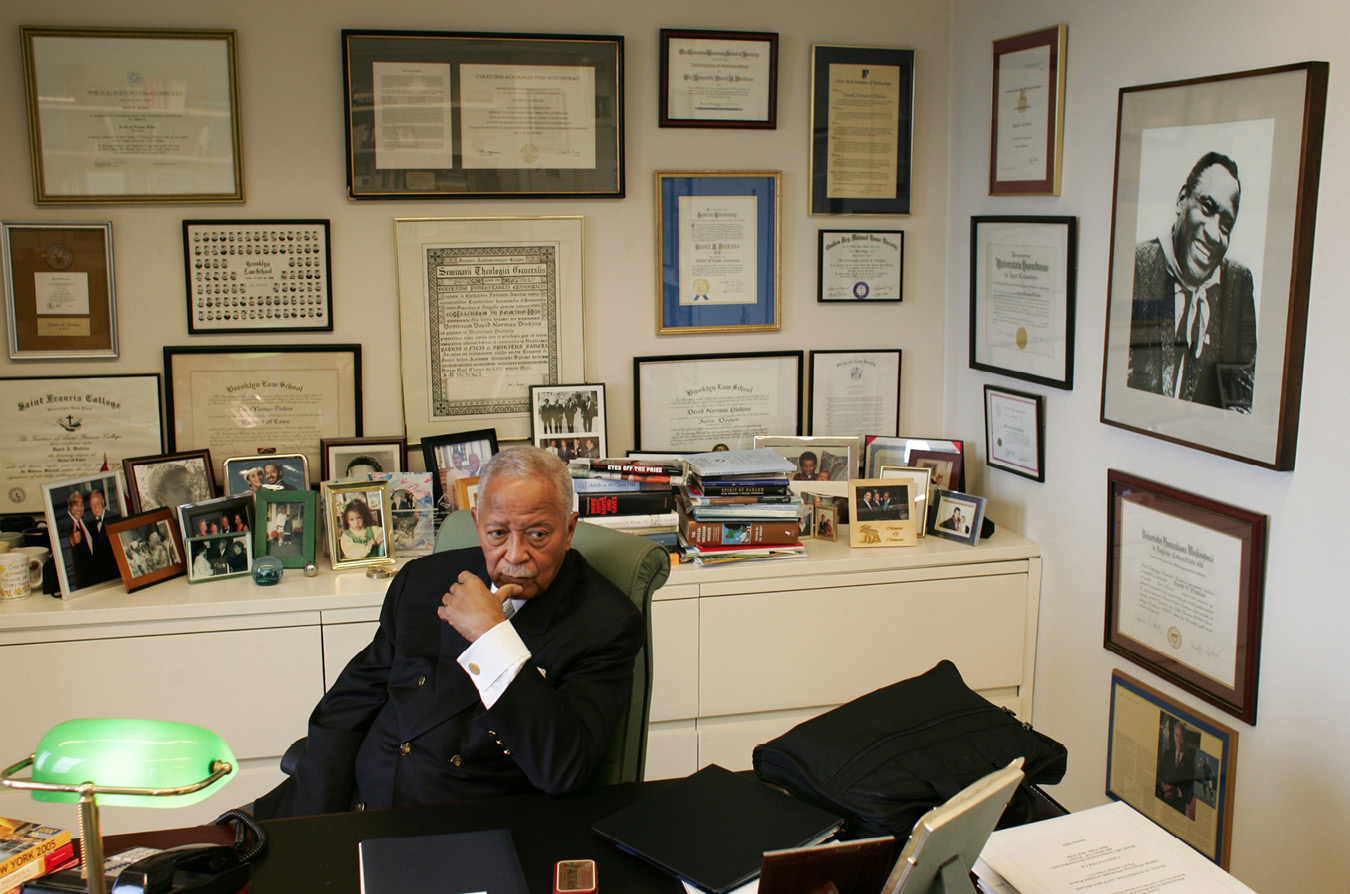
Former New York City mayor David Dinkins in his office with Robesons photograph in 2005. Photo courtesy Richard Perry, New York Times.
* * *
Paul Robeson Jr. stressed in a television interview in 1971 that his father had survived unprecedented attacks against him. And theres a certain majestic triumph in the fact that he has retired a sort of undefeated champion. He never took a word back, and he retired unbowed and undefeated.
Since Robesons death in 1976, his son has worked consistently to preserve and promote his fathers legacy. His efforts culminated in 1998 with widespread celebrations of the centennial anniversary of Robesons birth, and he gave the bulk of his fathers papers to the Moorland-Spingarn Research Center at Howard University in Washington, DC. He also wrote a perceptive two-volume biography, The Undiscovered Paul Robeson , containing personal insights into the complex relationship of his parents.
* * *
On a personal note, I have firsthand memories of Paul Robeson. I saw him perform many times, visited him backstage several times, and spoke with him briefly on those occasions. This experience encourages me to hope that I can add something to the remembrance of this remarkable man.
My research includes everything that I could track down about him in books, newspapers, magazines, and television documentaries, as well as thousands of original documents, diaries, speeches, and letters. Writing at this time gives me access to extensive information that has come to light in recent years, helping to illuminate his life. And the passage of time provides additional perspective in viewing the events and controversy that swirled around him.
Since ones political perspective can influence the view of communism and the McCarthy era, it might be appropriate for me to note that I am politically mainstream, with no ideological agenda, then or now. I still agree with the view of my late mother, a fiercely patriotic lady, who said more than once, I wish our Paul didnt like Russia so much.
I worked as a reporter for the New York Times for more than thirty years before I retired from daily journalism. By inclination and experience, I am a reporter rather than an academic or an ideologue. It is my intent to tell the Robeson story as accurately, clearly, and fairly as I can, in the context of the times.
Paul Robeson is a man worth remembering, a notable part of our nations history. And for the happy few who remember him well, he remains Our Paul.
Arnold H. Lubasch
Acknowledgments
M y personal thanks to the following people:
Paul Robeson Jr. and his wife, Marilyn, for their long friendship and informative conversations. And to Paul Jr.s publisher for granting permission to use limited material from his fathers books.
Pete Seeger for his firsthand account of the Peekskill concert and rioting, in a long telephone interview with me.
Robert Sherman for his recollections of his aunt, Clara Rockmore, and her friend Paul Robeson, in a telephone interview with me.

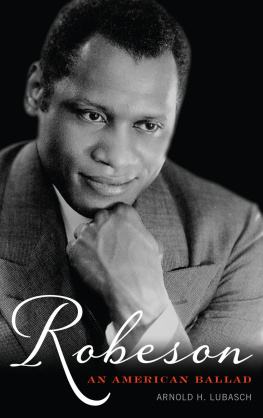
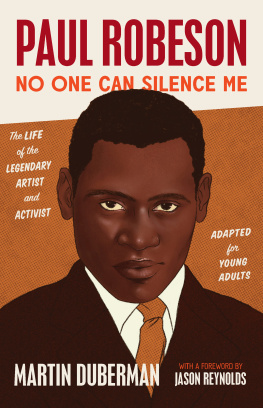
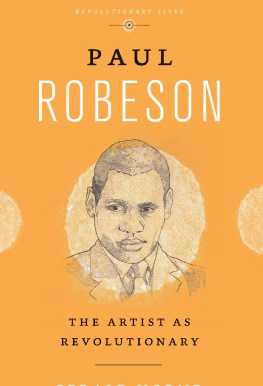
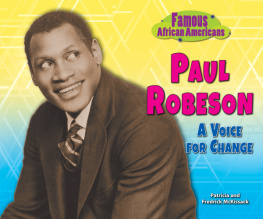

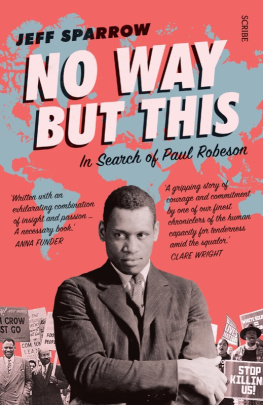
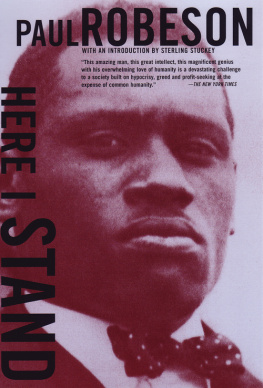

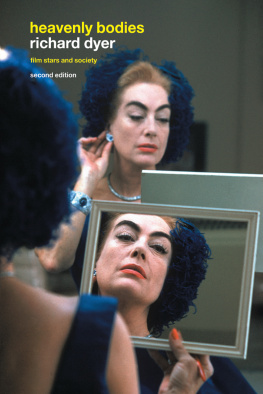
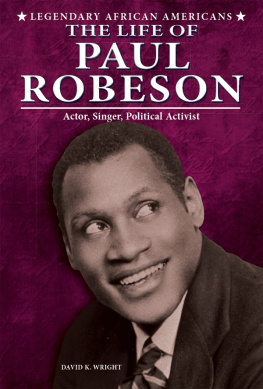
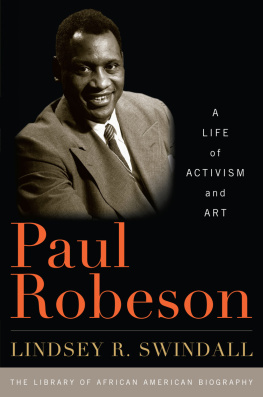


 The paper used in this publication meets the minimum requirements of American National Standard for Information SciencesPermanence of Paper for Printed Library Materials, ANSI/NISO Z39.48-1992.
The paper used in this publication meets the minimum requirements of American National Standard for Information SciencesPermanence of Paper for Printed Library Materials, ANSI/NISO Z39.48-1992.